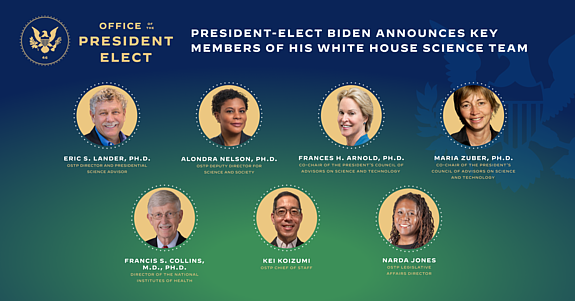Alondra Nelson Appointed to White House Science Team

Alondra Nelson, Harold F. Linder Professor in the School of Social Science at the Institute for Advanced Study and President of the Social Science Research Council (SSRC), has been appointed by President-elect Joe Biden to the position of Deputy Director for Science and Society in the Office of Science and Technology Policy (OSTP). Nelson will be the first person in this role, which brings social science expertise explicitly into the work of federal science and technology strategy and policy.
“Science, at its core, is a social phenomenon. It’s a reflection of people, our relationships, and our institutions. There is an incredible window of opportunity ahead of us to approach our science and technology policy in ways that are accountable, inclusive, and trustworthy,” Nelson said. “I am honored to be entrusted with this important role in public service at this critical time in this nation’s history.”
Watch Nelson's remarks from the announcement event.
An acclaimed sociologist, Nelson’s major research contributions are situated at the intersection of racial formation and social citizenship, on the one hand, and emerging scientific and technological phenomena, on the other. She explores and connects these dimensions in a range of publications, including Technicolor: Race, Technology, and Everyday Life; Genetics and the Unsettled Past: The Collision of DNA, Race, and History; Body and Soul: The Black Panther Party and the Fight Against Medical Discrimination; and The Social Life of DNA: Race, Reparations, and Reconciliation after the Genome. A member of the editorial board of Social Studies of Science, her essays, reviews, and commentary have appeared in numerous publications including The New York Times, The Washington Post, The Wall Street Journal, Science, Le Nouvel Observateur, and National Public Radio.
Nelson serves on the Boards of the Andrew W. Mellon Foundation and the Russell Sage Foundation, the American Association for the Advancement of Science, and the Data and Society Research Institute. She co-chairs the Committee on Emerging Science, Technology, and Innovation for the National Academy of Medicine. Nelson additionally served on the Committee on New and Emerging Forms of Data, Economic and Social Research Council, UK Research and Innovation. Her many honors and awards include the MIT Morison Prize, the Mirra Komarovsky Book Award, the Letitia Woods Brown Memorial Book Award, and the Poorvu Award for Distinguished Interdisciplinary Teaching at Yale University.
“Alondra Nelson is a distinguished scholar and leading researcher on critical issues of science and society,” said Robbert Dijkgraaf, IAS Director and Leon Levy Professor. “During her illustrious career, Alondra has been committed to the highest ideals of scholarship, diversity, and intellectual exchange, always with the aim of a more just and equitable society. The Institute for Advanced Study is strengthened and enriched through her leadership. I couldn’t imagine a better person for this important position in such crucial times.”
Nelson received a B.A. from the University of California at San Diego and M.Phil. and Ph.D. from New York University. In addition to her positions at IAS and SSRC, Nelson previously served as Dean of Social Science and Professor of Sociology at Columbia University. In her early career, Nelson was an assistant professor of African American Studies and Sociology at Yale. She is an elected member of the American Academy of Arts and Sciences, the American Philosophical Society, and the National Academy of Medicine.
The OSTP, an agency within the Executive Office of the President established in 1976, has a threefold mission: first, to provide the President and his senior staff with accurate, relevant, and timely scientific and technical advice on all matters of consequence; second, to ensure that the policies of the Executive Branch are informed by sound science; and third, to ensure that the scientific and technical work of the Executive Branch is properly coordinated so as to provide the greatest benefit to society.
Eric Lander, a mathematician and geneticist, who founded the Broad Institute and is Professor of Biology at MIT and Professor of Systems Biology at Harvard Medical School, will serve as Science Advisor to the President and will direct the Office of Science and Technology Policy.
It was also announced today that Frances Arnold, Nobel Laureate and Linus Pauling Professor of Chemical Engineering, Bioengineering and Biochemistry at the California Institute of Technology, and Maria Zuber, Vice President of Research at MIT, will co-chair the President’s Council of Advisers on Science and Technology (PCAST), an advisory body administered by OSTP.
About the Institute
The Institute for Advanced Study is one of the world's foremost centers for theoretical research and intellectual inquiry. Located in Princeton, N.J., the IAS is dedicated to independent study across the sciences and humanities. Founded in 1930, the Institute is devoted to advancing the frontiers of knowledge without concern for immediate application. From founding IAS Professor Albert Einstein to the foremost thinkers of today, the IAS enables bold, curiosity-driven innovation to enrich society in unexpected ways.
Each year, the Institute welcomes more than 200 of the world's most promising post-doctoral researchers and scholars who are selected and mentored by a permanent Faculty, each of whom are preeminent leaders in their fields. Among present and past Faculty and Members there have been 35 Nobel Laureates, 42 of the 60 Fields Medalists, and 19 of the 22 Abel Prize Laureates, as well as many MacArthur Fellows and Wolf Prize winners.